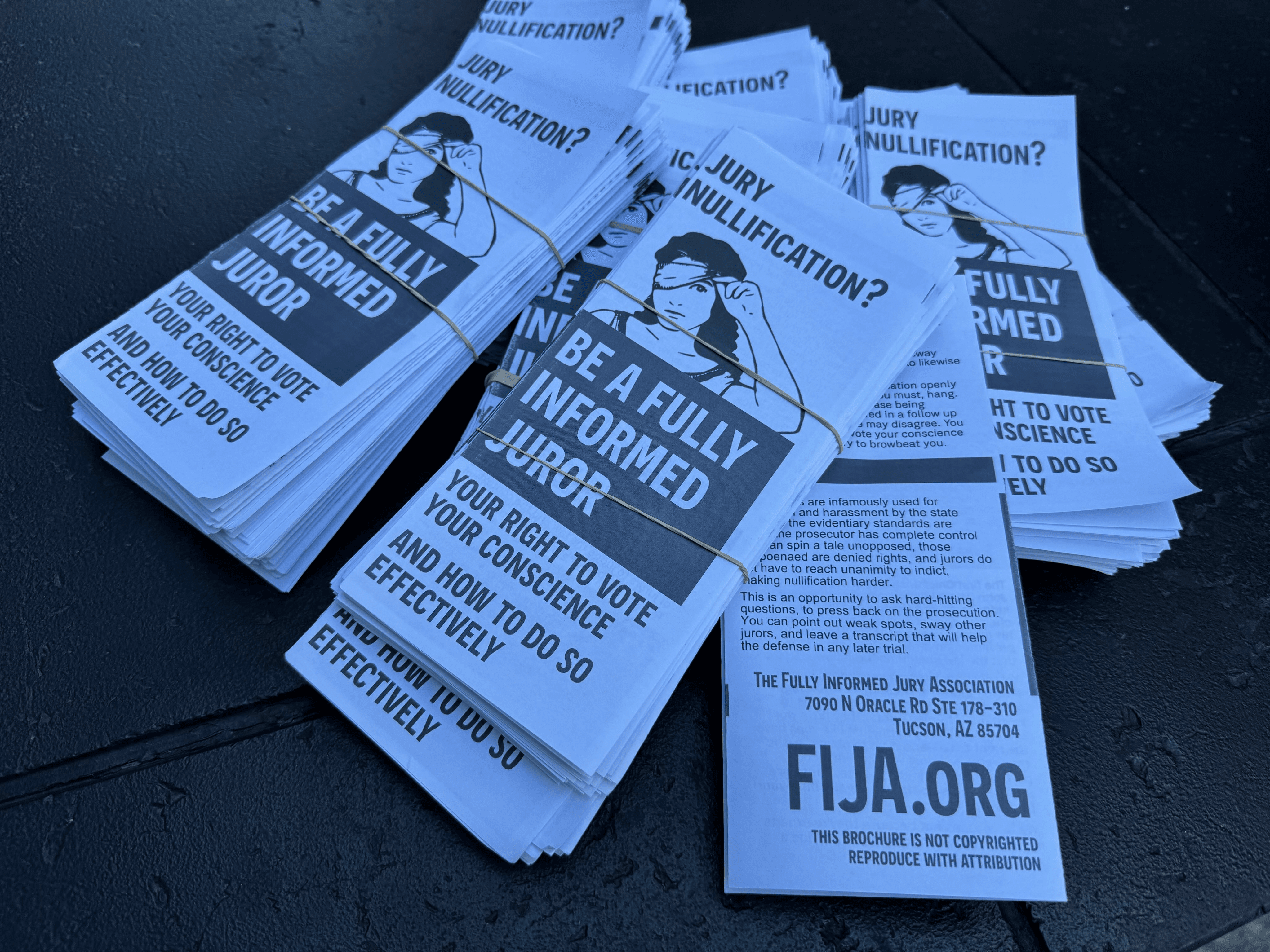
FIJA is a non-partisan organization, but has supported various FIJA activists doing educational outreach to those attending "No Kings" protests, as the ostensible anti-authoritarian framing of such can provide a foundation for conversations about the importance of jury rights and limits on government power. We have an article on our substack explaining our reasoning. The following is a report back from one FIJA activist:
"No Kings" (and similar events) present a rare opportunity for activists: a reliable concentration of people who are probably interested in activism enough to attend jury duty but who probably aren’t interested enough to be ineligible for jury duty.
As such, we decided to spend a few hours handing out FIJA’s latest educational pamphlet and to share what we learned when doing so.
Preparation
Before anything, make sure you know what you can and can’t do when organizing for Jury Nullification:
- NEVER talk to a sitting juror about their trail.
- NEVER mention a specific or ongoing case, particularly a local one.
- DO make sure to keep the discussions informative, oriented towards the justice system in general, and about people who may become future jurors.
Next: figure out how to print and fold the pamphlets! There are services, local shops, and perhaps even a distro that can print and fold them with a machine for you. A cursory google search shows one website quoting $0.04 a page. We didn’t have a printer and ended up using a local library at the cost of $0.20 per pamphlet. When folding, make sure you know where the front and back are so you don’t fold 500 of them incorrectly, like we did. We also suggest finding friends to help out, as three people can do as much in a few hours as one person spending multiple evenings.
Day Of
Once on the ground at the protest, we faced a huge problem: How do we start conversations with people? Jury nullification is a complex topic, and the name doesn’t lend itself to an easy slogan. After some experimenting, we found the most effective approach is to find somewhere relatively quiet: no active chants, dense crowds, or bands playing. Once in this space (which may be on the move during a march), approach people, make eye contact, hold up the flyer, and ask them ‘do you know your rights as a juror?’. Starting the conversation on the framework of legal rights is legible to most Americans, and it invokes immediate interest: we’re telling you of something you possess that you might not have heard about before.
At No Kings, usually the answer was some
variation of ‘Huh? I’m not sure’, and we’d follow up with ‘Jury Nullification is your right to vote your conscience when attending jury duty’. Depending on who we’re talking to, we’d have a few different follow ups:
- ‘This pamphlet is about how to use your right effectively and it’s history’ (If they already know about jury nullification, or as the end of the discussion)
- ‘This has the support of supreme court justices left and right’ (If they seemed skeptical)
- ‘This was used during the pre-civil war period to release people captured under the fugitive slave act’ (If they’re uncertain about why they would need to use their right)
When approaching to people, we talked to a wide age range. Older folks can opt out of jury duty and we were surprised by how many already knew about jury nullification! But if they’re at No Kings they’re politically active and might steward spaces that would be interested in jury nullification, or just have friends and family that could be called for jury duty. Meanwhile, younger folks must attend jury duty but may not yet know that they have these rights.
We also attempted to recruit other orgs and spaces within the event to help us distribute the fliers. There’d be small unattended piles of literature that we’d add to, or people tabling who might be interested in helping distribute the pamphlets. We found that official organizations would accept a few pamphlets but not put them out, and that individuals or small groups of activists often would help us out once they understood what we were offering. In the future, it probably would have been better to talk to these orgs before hand, or at least while they’re setting up, so that they had a lower pressure environment to evaluate us and the information we where providing.
Also, don’t forget the basics of attending any protest or march: sunscreen, water, good shoes, etc. are vital.
We hope this report back supports other FIJA activists interested in attending other events.


